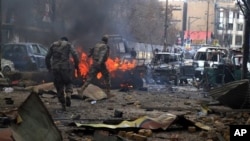ISLAMABAD —
Between 2008 and 2013, Pakistan saw roughly two major bombings per day, each blast wounding or killing an average of at least five people.
The attacks, including the use of Improvised Explosive Devices (IEDs), has made Pakistan one of the most dangerous places in the world, according to Iain Overton, policy director of the London-based Action on Armed Violence (AOAV).
“One of the major problems is the amount of munitions coming from Afghanistan into Pakistan and the spread of extremist views that causes the use of IEDs as a normalized form of weaponry,” Overton said at a recent conference in Islamabad.
Pakistan now has the third highest homemade bomb and suicide blast rate in the world, higher than even neighboring Afghanistan.
According to a recently published AOAV report, victims of bombs that detonate in densely populated urban areas are predominantly civilian. Overton says bombs used in Pakistan range from pressure cooker devices to small magnetized explosives that attach to cars, suicide-bomb vests and belts, and vehicle-borne bombs which tend to carry large amounts of explosives.
Some of the devices are constructed using techniques developed by militants in Iraq and Afghanistan.
According to Shafqat Malik, head of the Peshawar-based bomb disposal unit for the northwest Khyber Pakhtunkhwa province, which borders tribal militant areas, new types of IEDs are emerging.
A longtime staple of the Iraq and Afghan insurgencies, shaped charge IEDs, designed to pierce armored vehicles or fortified buildings, are now turning up Pakistan. While Malik's team has managed to defuse such bombs, they are also faced with another deadly new trend: small personalized bombs hidden in tin cans and sent to intimidate specific targets who do not give in to extortion demands.
Analysts say the bombs have a devastating effect on the country, not only demoralizing those who begin to doubt government safeguards, but also inflicting heavy psychological and physical costs.
Already underfunded public hospitals, for example, often have to cope with the blast victims and perform massive trauma surgeries and amputations without any financial government compensation.
Malik also says the political cost for a country that is unable to stem the violence is high.
“They are demoralizing the people, and if they use IEDs, and they are successful, then the masses are losing the confidence in the government, then it is almost a destabilization, we are leading into a destabilization,” he said.
After years of trying and failing to stem the rising violence, many who are involved in peace efforts are exasperated.
Malik says although more people are reporting to police where bombs are being placed because their lives are at risk, few people are willing to inform on the perpetrators, both out of tribal loyalty and the knowledge that they could be targeted next.
The attacks, including the use of Improvised Explosive Devices (IEDs), has made Pakistan one of the most dangerous places in the world, according to Iain Overton, policy director of the London-based Action on Armed Violence (AOAV).
“One of the major problems is the amount of munitions coming from Afghanistan into Pakistan and the spread of extremist views that causes the use of IEDs as a normalized form of weaponry,” Overton said at a recent conference in Islamabad.
Pakistan now has the third highest homemade bomb and suicide blast rate in the world, higher than even neighboring Afghanistan.
According to a recently published AOAV report, victims of bombs that detonate in densely populated urban areas are predominantly civilian. Overton says bombs used in Pakistan range from pressure cooker devices to small magnetized explosives that attach to cars, suicide-bomb vests and belts, and vehicle-borne bombs which tend to carry large amounts of explosives.
Some of the devices are constructed using techniques developed by militants in Iraq and Afghanistan.
According to Shafqat Malik, head of the Peshawar-based bomb disposal unit for the northwest Khyber Pakhtunkhwa province, which borders tribal militant areas, new types of IEDs are emerging.
A longtime staple of the Iraq and Afghan insurgencies, shaped charge IEDs, designed to pierce armored vehicles or fortified buildings, are now turning up Pakistan. While Malik's team has managed to defuse such bombs, they are also faced with another deadly new trend: small personalized bombs hidden in tin cans and sent to intimidate specific targets who do not give in to extortion demands.
Analysts say the bombs have a devastating effect on the country, not only demoralizing those who begin to doubt government safeguards, but also inflicting heavy psychological and physical costs.
Already underfunded public hospitals, for example, often have to cope with the blast victims and perform massive trauma surgeries and amputations without any financial government compensation.
Malik also says the political cost for a country that is unable to stem the violence is high.
“They are demoralizing the people, and if they use IEDs, and they are successful, then the masses are losing the confidence in the government, then it is almost a destabilization, we are leading into a destabilization,” he said.
After years of trying and failing to stem the rising violence, many who are involved in peace efforts are exasperated.
Malik says although more people are reporting to police where bombs are being placed because their lives are at risk, few people are willing to inform on the perpetrators, both out of tribal loyalty and the knowledge that they could be targeted next.









